Related Research Articles

Chabad, also known as Lubavitch, Habad and Chabad-Lubavitch, is an Orthodox Jewish Hasidic dynasty. Chabad is one of the world's best-known Hasidic movements, particularly for its outreach activities. It is one of the largest Hasidic groups and Jewish religious organizations in the world. Unlike most Haredi groups, which are self-segregating, Chabad operates mainly in the wider world and caters to secularized Jews.

Yeshiva Rabbi Chaim Berlin or Yeshivas Rabbeinu Chaim Berlin is an American Haredi Lithuanian-type boys' and men's yeshiva in Brooklyn, New York.
Chief Rabbi is a title given in several countries to the recognized religious leader of that country's Jewish community, or to a rabbinic leader appointed by the local secular authorities. Since 1911, through a capitulation by Ben-Zion Meir Hai Uziel, Israel has had two chief rabbis, one Ashkenazi and one Sephardi.

The Hebrew Union College – Jewish Institute of Religion is a Jewish seminary with three locations in the United States and one location in Jerusalem. It is the oldest extant Jewish seminary in the Americas and the main seminary for training rabbis, cantors, educators and communal workers in Reform Judaism. HUC-JIR has campuses in Cincinnati, Ohio, New York City, Los Angeles, California, and Jerusalem. The Jerusalem campus is the only seminary in Israel for training Reform Jewish clergy.
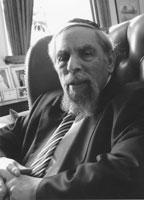
Louis Jacobs was a leading writer, Jewish theologian, and rabbi of the New London Synagogue in the United Kingdom. He was also the focus in the early 1960s of what became known as the "Jacobs Affair" in the British Jewish community.
In early modern Europe, particularly in Germany, a court Jew or court factor was a Jewish banker who handled the finances of, or lent money to, royalty and nobility. In return for their services, court Jews gained social privileges, including, in some cases, being granted noble status.

Jewish writers in England during the pre-expulsion period of the eleventh through the thirteenth centuries produced different kinds of writing in Hebrew. Many were Tosafists; others wrote legal material, and some wrote liturgical poetry and literary texts.
It is believed that the first Jews in England arrived during the Norman Conquest of the country by William the Conqueror in 1066. The first written record of Jewish settlement in England dates from 1070. They suffered massacres in 1189–90. In 1290, all Jews were expelled from England by the Edict of Expulsion.

Jonathan Henry Sacks, Baron Sacks was an English Orthodox rabbi, philosopher, theologian, and author. Sacks served as the Chief Rabbi of the United Hebrew Congregations of the Commonwealth from 1991 to 2013. As the spiritual head of the United Synagogue, the largest synagogue body in the United Kingdom, he was the Chief Rabbi of those Orthodox synagogues but was not recognized as the religious authority for the Haredi Union of Orthodox Hebrew Congregations or for the progressive movements such as Masorti, Reform, and Liberal Judaism. As Chief Rabbi, he formally carried the title of Av Beit Din (head) of the London Beth Din. At the time of his death, he was the Emeritus Chief Rabbi.
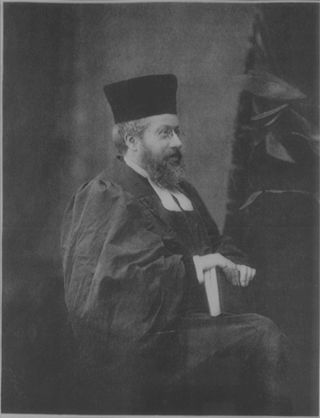
Hermann Adler HaKohen CVO was the Chief Rabbi of the British Empire from 1891 to 1911. The son of Nathan Marcus Adler, the 1911 Encyclopædia Britannica writes that he "raised the position [of Chief Rabbi] to one of much dignity and importance."
Aaron of York or Aaron fil Josce, was a Jewish financier and chief rabbi of England. He was born in York before 1190 and died after 1253. He was probably the son of Josce of York, the leading figure in the York pogrom of 1190.
The Presbyter Judaeorum was the chief official of the Jews of England prior to the Edict of Expulsion. The office appears to have been for life, though in two or three instances the incumbent either resigned or was dismissed. Prynne argues that the Presbyter Judaeorum was merely a secular officer in the Exchequer of the Jews to keep the rolls of control, whereas Tovey argues that the use of "sacerdos" and "pontifex" as synonymous of the office shows its ecclesiastical character.
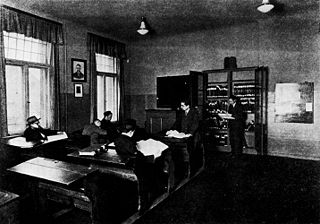
The Hildesheimer Rabbinical Seminary was founded in Berlin on 22 October 1873 by Rabbi Dr. Israel Hildesheimer for the training of rabbis in the tradition of Orthodox Judaism.
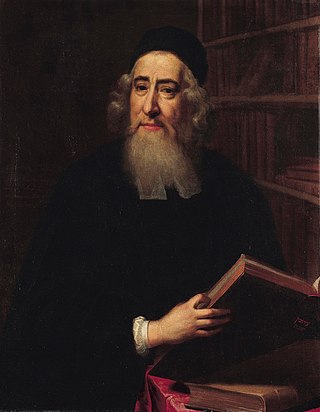
Rabbi Aaron Uri Phoebus Hart was a British rabbi, who served as spiritual leader of the Ashkenazi Great Synagogue of London from 1704 until his death. He is widely regarded as the first chief rabbi of Great Britain.
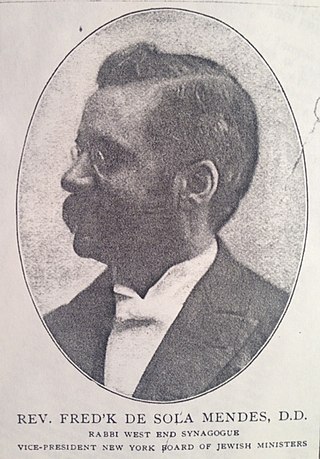
Frederick de Sola Mendes was a rabbi, author, and editor.

Yom Tovof Joigny, also denoted of York was a French-born rabbi and liturgical poet of the medieval era who lived in York, and died in the massacre of the Jews of York in 1190. A Hebrew language hymn attributed to him, transliterated "Omnam Kayn" or "Omnam Ken" is still recited in Eastern Ashkenazi synagogues each year on the evening of Yom Kippur, the Day of Atonement. He was a student of Rabbeinu Tam.
Josce of York was the leader of the Jewish community in York, England, and the leading figure in the York pogrom of 1190. He committed suicide along with nearly the entire Jewish community, rather than face death or conversion at the hands of an angry mob.
Aaron Worms was a chief rabbi of Metz and a Talmudist; the son of Abraham Aberle, he was born July 7, 1754, in Geislautern, a small village near Völklingen ; died at Metz, May 2, 1836.
References
- ↑ Aaron of York in The Jewish Encyclopedia